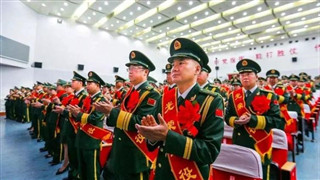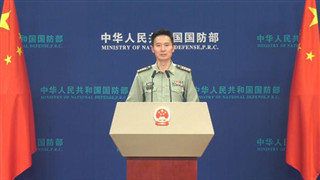笪志刚
By Da Zhigang
明治维新使日本实现近现代化并跻身西方列强行列,当时推行的“殖产兴业”和“富国强兵”等国策既是日本构筑现代产业能力和科技实力的催化剂,也成为其对外发动侵略战争的前提条件。尤其是“富国强兵”,最终成为日本穷兵黩武走向失败的一面镜子。
The Meiji Restoration modernized Japan and made it a western power. The policies implemented by Japan in that period to develop industries and strengthen the country and army catalyzed its forging of modern industrial and technological strengths, and readied it to launch external aggressions. Japan’s policies of strengthening the nation and army, however, ended up pushing the country onto the militarist road and finally to a fiasco.
最近,日本自民党提出“新成长战略”框架大纲,明确提出侧重“经济政策和企业活动”与“安全保障无缝链接”的所谓“经济安全保障视域下的投资战略”,亦即今后的经济增长、产业振兴及企业投资等,将与国防安全、军事保障及遏制能力等有机结合。日本舆论有人称之为令和版的“富国强兵策”。那么,这份“新成长战略”的实施前景和实际影响将会怎样?
The Liberal Democratic Party of Japan (LDP) recently put forth a framework of “new growth strategy” and the so-called “investment strategy in the context of economic and security guarantee” that emphasized the “seamless connection between economic policy, corporate activities, and security guarantee”. In other words, Japan’s policies on economic growth, industrial promotion and corporate investment will be combined with those on defense, security and military guarantee and curbing capabilities. Some Japanese commentators called this the Reiwa version of the nation and army-strengthening policy. What are the prospects and possible effects of the “new growth strategy”?
首先,“新成长战略”凸显日本政界对国家走势的危机感及焦虑感。面对拜登总统积极推动国际协调和盟友合作、重新恢复全球和地缘影响力以及加大抑制中国的诸多尝试,日本政界一些人意识到现有经济定位无法支撑日趋复杂的国际博弈,现有经济模式难以辅助不断变化的双多边外交,同时咀嚼到在中美大国博弈中周旋的地缘焦虑感。
First of all, the “new growth strategy” highlights the Japanese political circle’s sense of crisis and anxiety about where the country is going. While US President Biden is actively calling for international coordination and ally cooperation, restoring America’s global and geopolitical influence, and ramping up the containment of China, some Japanese politicians have realized that the current economic position cannot sustain Japan in the increasingly complicated international game, and the current economic model cannot assist in the fast-changing bilateral and multilateral diplomacy either. At the same time, they also feel anxious about being caught up in the middle of the China-US major-country struggle.
这使他们认为,需以一种崭新的战略来修正“重经济、轻安保”“重合作、轻遏制”的经济与安保相对乖离的现状,主动推动经济成长服务国家安保的“护航船队”角色转换,进行经济增长与安保博弈合二为一的大战略调整。
Therefore, they believe it is necessary to introduce a new strategy to rectify the current economic pattern that is rather disengaged from security and pays more attention to cooperation than containment, and to reposition economic growth actively as an “escort” that serves national security. The major strategic adjustment is to integrate economic growth with security.
其次,“新成长战略”推动朝野形成经济服务地缘安保的新意识。日本一些政治精英认为,过去很长时期,日本较为追求经济优先和合作利益,常将“经济”与“安全”分开对待,导致所谓日本不断因为经济因素而被绑架。这次“新成长战略”之所以引发热议,很大原因就在于其折射了日本开始正视“经济底力支撑国家外交和安全保障”的转变。
Second, the “new growth strategy” converges a new consensus between the ruling party and opposition parties on economy serving geopolitical security. According to some political elites in Japan, the country has given too much priority to economic and cooperation benefits for a long time and has often separated economy from security.The policy constantly hijacks Japan for economic factors. The “new growth strategy” has been so intensely discussed largely because it demonstrates the country has finally realized that “economic strengths underpin national diplomacy and security guarantee”.
“新成长战略”还释放了“经济增长和防卫费联动”的信号,聚焦防卫预算不需拘泥于占GDP的比例,指出提升防卫费不仅事关日本安保战略和能力,还是强化美日同盟和美日印澳等双多边安保机制的重要体现,推动防卫费占GDP比例实现重大突破的姿态跃然纸上。
The new strategy also sends the signal of “connecting economic growth with defense budget”. Intending to free Japan’s defense budget from the limitation to a certain percentage of GDP, Japanese policymakers insisted that increasing the defense expense not only concerns the country’s security strategy and capability but also can intensify the US-Japan alliance and the bilateral and multilateral security mechanisms among the US, Japan, India and Australia.
最后,“新成长战略”并不掩饰剑指中俄等地缘竞争对手的意图。大纲认为中俄联手趋势不断形成,渲染中国对日本海域及台湾海峡施压、在南海等海域展示海空力量、利用经济实力巩固地缘安保等等,借此声称日本需要重新审视安全与经济无法相交的既有思维,以经济和安保双轮扩大对华博弈的主动权和抑制力。有人还称需正视中日防卫预算差距扩大至4倍等现实,尽快制订安全保障视域下的对华经济政策。
At last, the “new growth strategy” doesn’t hide its intention of targeting at geopolitical competitors like China and Russia. The framework sees ever closer China-Russia cooperation and drums about China’s pressuring in Japanese waters and the Taiwan Strait, display of naval and air force strengths in the South China Sea and other waters, and consolidation of geopolitical security leveraged on its economic strength. On that basis, the framework claims that Japan needs to review its current thinking that separates security from economy and increase its initiative and restrictive power against China on both fronts. Some also call Japan’s attention to the widening gap (a disparity of four times now) between China’s and Japan’s defense budget and urge it to come up with corresponding economic policies toward China in the context of security guarantee.
出台怎样的增长战略无疑是自民党乃至日本政府的权利,但从本质上说,这次的“新成长战略”怎么看都脱不了为日本向美选边站背书的干系,也充满配合美国在产业和科技上抑制中国的意味。且不说这种做法本身有悖于全球化和多边主义等区域合作理念,真照这个思路走下去,不仅将使日本失去多年摸索形成的经济外交的主动权和对外合作的灵活优势,也将对日本经济界造成实质损失和额外的投资困惑,并将进一步损害中日政治互信,伤及两国民意,日本最终会自尝苦果。
The LDP or the Japanese government has the right to roll out whatever growth strategy it wants, but the “new growth strategy”, no matter how you look at it, is in nature an endorsement of Japan taking America’s side and a move to assist in America’s suppression of China on the industrial and technological end. This is first and foremost against regional cooperation concepts such as globalization and multilateralism. If Japan decides to walk down this path, it will lose the economic and diplomatic initiative that it has obtained through long years of explorations as well as its flexibility in foreign cooperation. Moreover, such a tendency will cause substantive losses and extra investment bewilderment on Japanese businesses, further harm the political mutual trust between China and Japan, and hurt the feelings of people in both countries. In the end, Japan will eat its own bitter fruits.
历史殷鉴不远,经济与安保捆绑下的全民皆兵走势更让人们担心日本是否会重蹈覆辙。对日本而言,高举和平发展与合作共赢旗帜,坚持走和平发展道路和与邻为善,同中国等国一道推进RCEP、中日韩FTA等区域一体化机制,无疑是最符合本国国策和长远利益的选择。
The historical lesson we’ve learned about Japan is still fresh in memory. Japan’s inclination for combining economy with security makes the world worry whether it will repeat its old militarist path. The option that suits Japan’s state policy and long-term interests most is holding up high the banner of peace, development and win-win cooperation, sticking to the path of peaceful development and good-neighborly relationships, and working with China and other countries to jointly advance the RCEP, China-Japan-ROK FTA, and other regional integration mechanisms.
(作者是黑龙江省社会科学院东北亚研究所所长、研究员,东北亚战略研究院首席专家)
(The author is director and researcher at the Institute of Northeast Asian Studies and chief expert at Institute of Northeast Asian Strategy, Heilongjiang Provincial Academy of Social Sciences)
Editor's note: This article is originally published on Huanqiu.com, and is translated from Chinese into English and edited by the China Military Online. The information, ideas or opinions appearing in this article do not necessarily reflect the views of eng.chinamil.com.cn.











